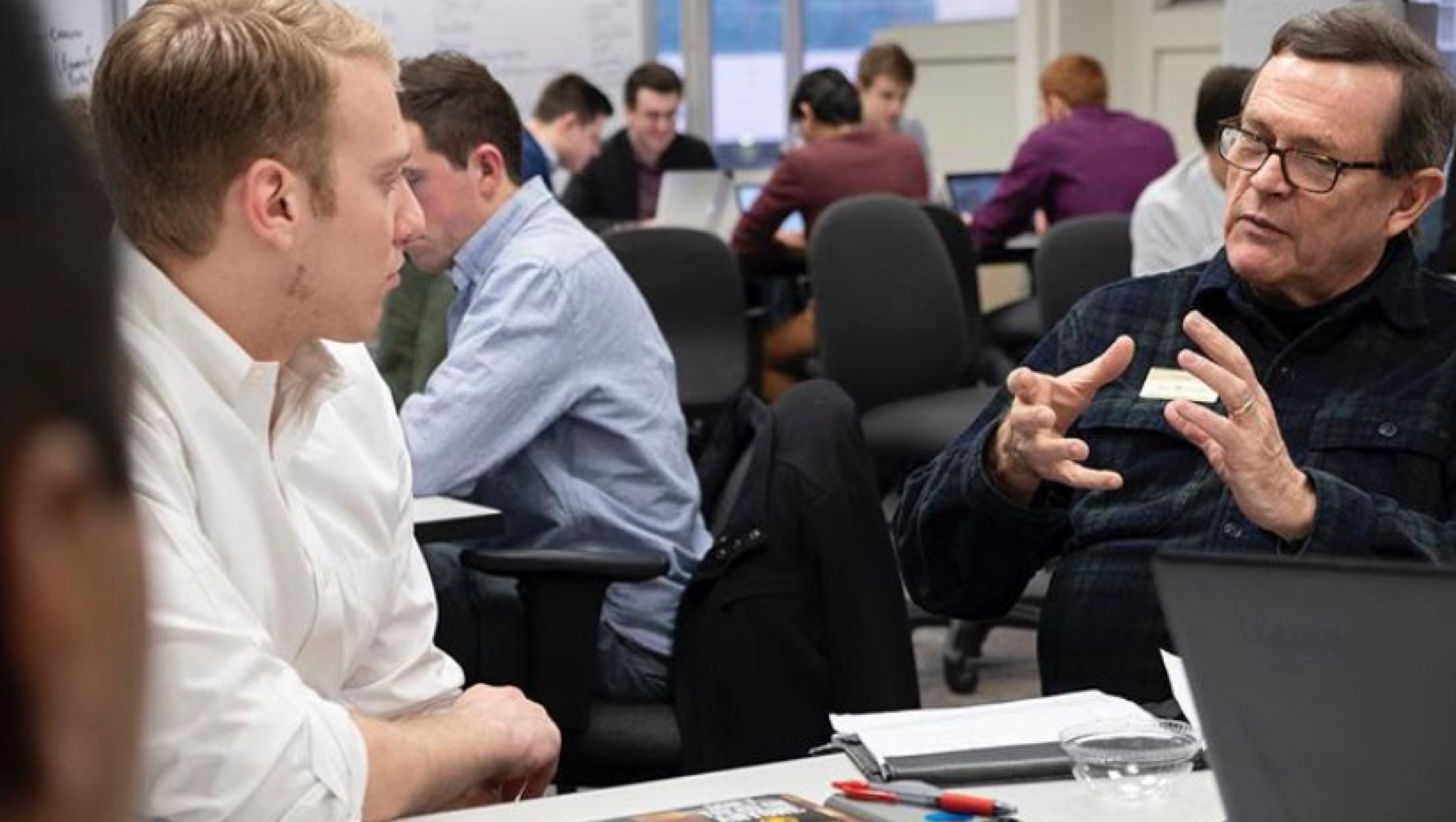
Are you thinking about meeting with one of our entrepreneurs in residence (EIRs)? If so, you might be wondering if there’s anything you need to prepare ahead of your EIR 1-on-1. While each of our EIRs’ meetings take on an individualized approach, there are some steps that each of them have in common. In our newest blog post, our entrepreneurs in residence have created a helpful outline as to what students should generally expect when meeting with an EIR for the very first time.
- Introduce yourself!
When going in to your first 1-on-1 with one of our entrepreneurs in residence, chances are that you’ll start with the typical ice-breaker questions (your name, where you’re from, what your background and major is, etc). But our EIRs find it important to get to know you on a more personal level (talk about your family, your hobbies/interests, etc). In addition to that, our EIRs also want to understand what it is that makes you tick: what are your underlying motivations and drive for pursuing any entrepreneurial idea? Have you always intended on becoming an entrepreneur? Is there a problem that you just can’t ignore and need to go solve it?
“By getting to know more about you and understanding what you ultimately want to accomplish with pursuing an entrepreneurial venture, my fellow EIRs and I can best guide you on where to focus your time and effort.” – Kelly Collier, EIR
“The source of your motivation can be really enlightening. People often get fixated on a particular solution, but if core motivations are understood, alternative solutions are more likely to be found. Also, like most things in business and in life in general, you are building a relationship with your EIR and mutual understanding is a key part of a meaningful relationship.” – Stephan Mueller, EIR
- Describe your idea, what problem you’re looking to solve with your idea, and share what your current status is on it. (if applicable)
It’s perfectly okay if you don’t have an idea in mind yet (if this is you, skip to step 3!). But if you are coming to your first EIR 1-on-1 with a startup/innovative idea in mind, this is the time to share it with the entrepreneur in residence. Some clarifying questions that our EIRs like to ask are: What is your idea? How far along is your idea? Do you have a team yet or do you need help putting together a team? What successes and challenges have you had while working on your idea so far?
It’s also important for the entrepreneur in residence to really understand what you do and don't already know about the problem you're intending to solve. Is this a problem that you have direct, first-hand experience with? What kind of research have you done to know who and how many people experience this particular problem? Or maybe you're not entirely sure what the problem is, in which case the EIR is happy to help you in determining that!
“The obvious reason for sharing your idea and where you’re at with it is to get the EIR on roughly the same page as your team. However, there are more underlying reasons as to why this step is important,” says Stephan. “This also tells me how prepared you are to give a summary, what things you focus on (the technology, the market, or the team, etc), and your general energy level towards the idea.”
Some EIRs might even ask you to give a rough-draft elevator pitch about your idea, where you talk about the main premise and highlight the most significant details of your idea for no longer than a couple minutes. Kelly shares her reasoning as to why this is important: “I want to hear how you naturally describe what you're working on. How you talk about your idea, what you emphasize, how you describe any progress you've made and upcoming plans, all will give great insight on where you are clearly an expert and where you may have some gaps to address.”

- Describe what your goals are. What does “winning” look like to you?
There are no right or wrong answers here. After all, there is no one “right” way to be innovative or to build a business. The “right” way for you and your business (if applicable) is highly dependent on where you want to end up. If you want to build a giant worldwide business, you will likely need to raise money along the way. That creates a particular direction and set of “right” activities. If you want to build a sustainable business or even a non-profit, there are a very different set of priorities that are likely to get you to that end. If your goal is to build an innovative and entrepreneurial skillset for you to apply in corporate America, then there will be varying activities and milestones to help you in achieving that goal.
With that being said, have realistic expectations about what can be accomplished in a certain period of time and remember that progress and results rarely happen overnight. You may want to build the world’s best CryptoBank, but if your team can’t code and doesn’t have a deep knowledge of that topic, chances are that you won’t get very far very quickly! But, if you’re willing to put in the work, you are limitless as to what you can accomplish!
- The EIR will then assess how they can best help you.
After knowing more about you, your idea, and your goals, the entrepreneur in residence will then have a better idea of how they can assist you along your entrepreneurial journey. Their support can take many forms, such as helping you come up with a strategy for different parts of your startup (marketing, logistics, fundraising, etc.), team building, introducing you to professionals within their network, and more!
“As a mentor, an EIR’s job isn’t to give teams all of the answers – rather, they are here to help mentor and guide you in the right direction and help you come to your own conclusions. Generally, the conversations you’ll have with an EIR focus on what information is needed to make decisions, how to approach getting the information you need, what the information you’re gathering is telling both of you, and of course, celebrating your “wins” along the way!” – Joanna Sutton, EIR
- Determine what’s next.
As you wrap up your 1-on-1, the EIR always closes with action items. They’ll want to know what your next steps are and when they will be done. Ideally, you’ll meet with an EIR a number of times through 1-on-1s and other Big Idea Center events, but they will help steer you in the direction of your next most immediate goal and help you think through specific steps to get you there.
About our EIRs & How to Schedule a Meeting:
Our EIRs are industry professionals who use their years of experience creating startups, leading corporations, being involved in the innovation community, and more to provide FREE consulting to Pitt students of all levels and disciplines. They are here to provide you with the knowledge and tools to help you get your idea to the next level!
Ready to meet with one of our entrepreneurs in residence? Go to our EIRs page, read their bios, and schedule a meeting today!